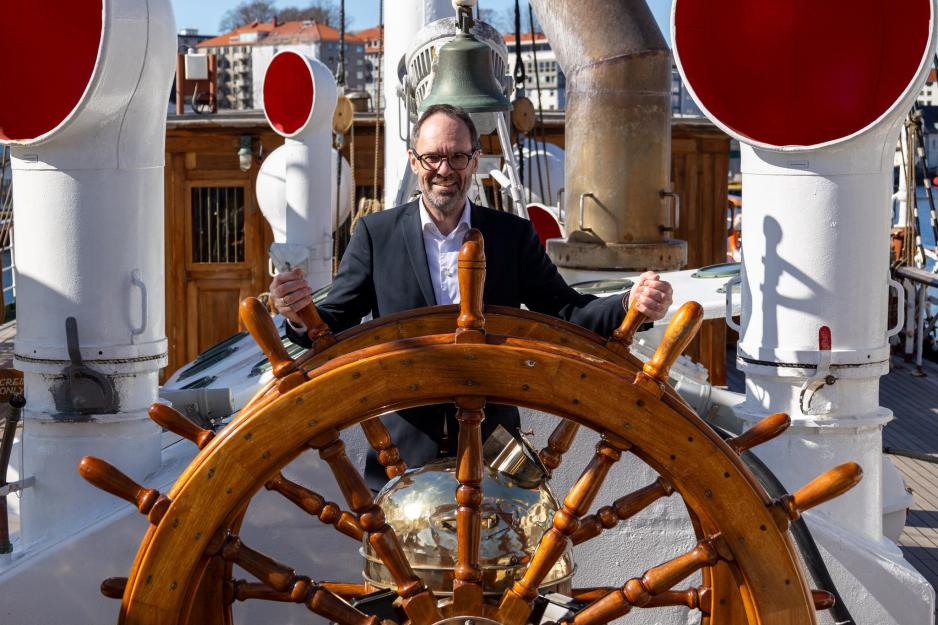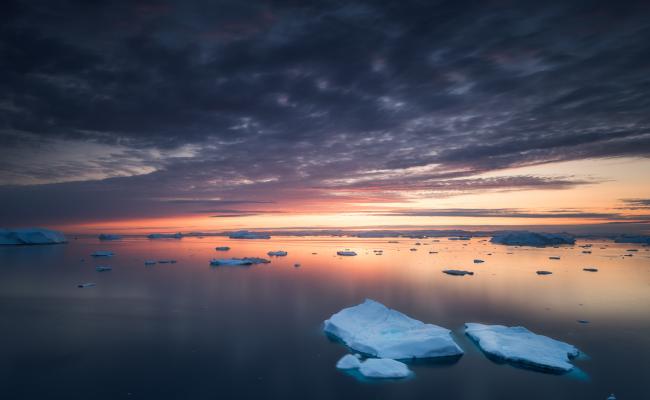The One Ocean Expedition Is About to Kick Off

Pro-Rector for Research and Development at UiT Jan-Gunnar Winther met with both Crown Prince Haakon and Director of Statsraad Lehmkuhl, Haakon Vatle, during One Ocean Week in Bergen on Monday. The week is a meeting place for debate and exchange of experiences and experiences related to the sustainable use of the ocean. (Photo: Helene Spurkeland at the Statsraad Lehmkuhl Foundation)
On Friday, the sailing ship Statsraad Lehmkuhl embarks on a 12-month voyage called One Ocean Expedition. In August and September, the ship will sail through the Northwest Passage, with researchers and students from UiT, the Arctic University of Norway, on board.
The One Ocean Expedition, a 12-month voyage aboard the sailing ship Statsraad Lehmkuhl, will commence on Friday. The voyage aims to raise awareness and share knowledge about the ocean's crucial role in a sustainable future from a global perspective.
The expedition leaves Bergen on Friday and returns to the city one year later. Both departure and return take place during One Ocean Week, a meeting place for debate and the exchange of experiences related to the sustainable use of the ocean.
Particular excitement surrounds the expedition's voyage through the Northwest Passage—in the footsteps of Roald Amundsen. UiT, the Arctic University of Norway, has chartered this part of the voyage for the Arctic Future Pathfinders course.
One Ocean Expedition
One Ocean Expedition 2025-2026 is a 12-month-long expedition with the sailing ship Statsraad Lehmkuhl. This will be the second in line after the One Ocean Expedition 2021-2023, which lasted for 20 months.
The voyage aims to promote ocean research and inspire action for sustainable oceans.
The ship will call at 26 ports on three continents, in addition to a historical voyage through the Northwest Passage in Roald Amundsen's footsteps.
The legacy of the voyage
The course gives ten credits and will be held twice with 60 participants in each stage; the first from Nuuk, Kalaallit Nunaat/Greenland, to Iqaluktuttiaq/Cambridge Bay, Canada, and the second from Iqaluktuttiaq/Cambridge Bay, Canada, to Anchorage, Alaska.
Some places are reserved for indigenous and local participants.
"There will be indigenous knowledge carriers onboard to ensure the transfer of various perspectives and knowledge about the Arctic and promote cultural exchange. Thus, the course becomes a platform to share different perspectives and experiences," writes UiT on their website, adding that the aim is to train students and young academics to become polar researchers.
The course is mainly targeted toward master's and PhD students, and participants come from both UiT and selected partner universities.
Research program
Researchers from UiT and the partner universities have developed a research program for the journey.
Research will be conducted on biodiversity, microplastics, physical oceanography, human health, marine studies, atmospheric studies, governance, and socio-economic aspects.
At the same time, the students will actively participate in daily routines, such as setting sail, navigation and watch duties. The combination of academic and practical work will promote experience-based learning and teamwork, writes UiT.
The Arctic Ocean 2050
The course is linked to the national research initiative Arctic Ocean 2050 and the upcoming International Polar Year 2032/2033.
Last summer, the research projects GoNorth and the Future Arctic Ocean merged into Norway's largest research project, the Arctic Ocean 2050 (Polhavet 2050).
As the ice melts in the world's northernmost ocean, the research project is to ensure knowledge and science diplomacy to maintain predictability and stability in the area.
18 Norwegian universities and research institutions are part of the Arctic Ocean 2050 project, including UiT.

Pro-Rector for Research and Development at UiT Jan-Gunnar Winther visited Statsraad Lehmkuhl during One Ocean Week in Bergen on Monday. The week is a meeting place for debate and exchange of experiences and experiences related to the sustainable use of the ocean. (Photo: Helene Spurkeland at the Statsraad Lehmkuhl Foundation)
Critical eye
In an op-ed this week, Dean Jørgen Berge and Pro-Rector for Research and Development Jan-Gunnar Winther at UiT that one must also look at such expeditions with a critical eye.
Associations to colonialism linked to the word expedition and the sight of a full-rigged ship in these waters are some of the things Berge and Winther highlight. They write that Indigenous participation and knowledge sharing are a natural part of the voyage and an essential part of the work following the Truth and Reconciliation Commission's report.
"However, our purpose for sailing through the Northwest Passage is clear: to provide students with an international perspective based on everything from local communities to international climate perspectives. When we are going to educate young people to become future polar researchers and knowledge carriers, we must give them a good start and, above all, teach them to understand and respect Arctic culture and history," they write and continue:
"In a world that is becoming increasingly divided, we are planning a student course that is about global unity, development, and reconciliation. We are bringing together an international group of 120 young people on a sailing ship, of which a significant proportion have roots in Arctic Indigenous communities. Together with researchers and teachers from UiT and representatives from local communities where we travel, the participants will create knowledge and experiences."
They want the students to develop innovative and adaptable solutions to future challenges and, thus, become new pathfinders in the future Arctic.
"Not like the historical pioneers who came with different intentions, including exploration and resource exploitation, but with humility and respect and a goal of creating a shared global future vision, rooted in the local and also guided by Arctic people's understanding of the world, knowledge systems, and cosmology, shaped through generations in interaction with nature," conclude Winther and Berge.


